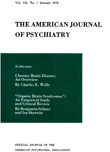CLINICAL LANGUAGE REHABILITATION OF THE VETERAN METHODS AND RESULTS
Abstract
This concludes a detailed account of 1 year's work of the speech therapist at the Mental Hygiene Clinic in Newark, N. J. Altogether about 100 patients have been tested, of whom 80 have been under regular treatment more than 3 months.
This, our first year, has been a year of organization and of hard work. We had to earn the confidence of our co-workers in the clinic and the Veterans Administration Medical Officer's satisfaction with our achievements. Last but not least, we had to be worthy of the faith, affection, and gratitude our patients bestowed upon us.
The work has been especially gratifying since most of the patients are in the prime of life and suffered their infirmities while fighting for the ideals of our country that were threatened. They deserve all the help it is possible to give.
This survey has by no means exhausted the entire field of voice and speech disorders. It is hoped that the knowledge and practical experience gained over a period of more than 20 years and the diversity of the clinic's material may be utilized not only in the Veterans Administration but in mental hygiene clinics everywhere. Successful treatment of speech disorders pays big dividends in terms of restoring the individual to an economically useful life and in relieving the taxpayer of the burden of supporting individuals so handicapped.
I wish to express my thanks to Dr. Thompson and Dr. Kutash.
Access content
To read the fulltext, please use one of the options below to sign in or purchase access.- Personal login
- Institutional Login
- Sign in via OpenAthens
- Register for access
-
Please login/register if you wish to pair your device and check access availability.
Not a subscriber?
PsychiatryOnline subscription options offer access to the DSM-5 library, books, journals, CME, and patient resources. This all-in-one virtual library provides psychiatrists and mental health professionals with key resources for diagnosis, treatment, research, and professional development.
Need more help? PsychiatryOnline Customer Service may be reached by emailing [email protected] or by calling 800-368-5777 (in the U.S.) or 703-907-7322 (outside the U.S.).



